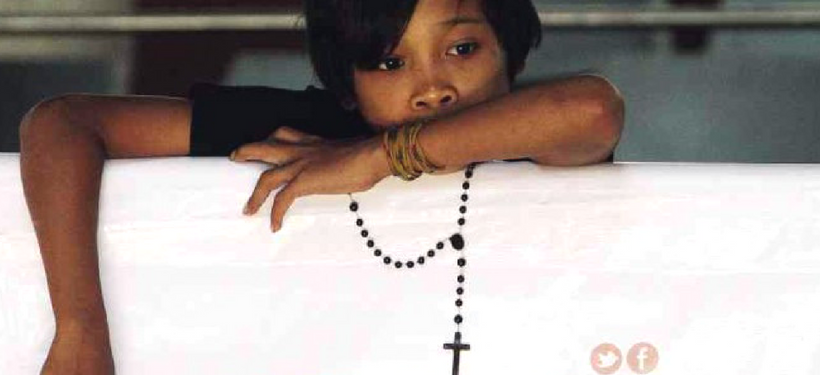
After recovering our energies last January, we have decided to also visit Tolosa and Tanauan, Leyte. A group of 17 volunteers (including 3 from Manila) left Cebu on the night of February 7 to reach Baybay, Leyte at dawn the following day. We had a full day ahead of us. First, we went to Burauen to distribute relief goods to students in a public high school. We did the same in Dagami Public High School and Javier Public High School. Graciously received by the people, we distributed relief goods – which include clothing and GI sheets for roof repair – to around 645 families. The funding of relief goods came from the City Council (Ayuntamiento) of Burgos and Fundación Cauce.
On the side, FPTI BCPD representatives also administered entrance exams to fourth year female high school students. Successful examinees could avail of scholarships in BCPD by next school year.
The public schools need new classrooms to cater to a population of 1,000 students. In one school, 7 classrooms were totally destroyed while 20 others seriously damaged. When classes resumed last January 6, they had to make do with the existing ones and with several makeshift classrooms built by the Department of Education. Their situation had been more difficult due to 2 recent typhoons and frequent rain showers. However, everyone we met there looked optimistic and was really grateful for our visit. When we informed them that local and foreign donors made this trip possible, they also mentioned the recently-built permanent classrooms were also funded by a foundation.
What we saw was just a glimpse of the deplorable experience of people from affected areas in Leyte, Samar, and Panay islands. Aside from lack of educational facilities, there was no power supply in many municipalities. There was also deficiency in public transportation system, even with vehicles that carry relief goods. But the resiliency of the people was clearly manifested in their efforts to bring the best out of a bad situation.
100 days after Haiyan
Last February 16 marked the 100th day since Haiyan devastated Central Philippines, killing 6,200 people, leaving approximately 2,000 missing and around 4 million people homeless. Recovery has been slow in coming. Despite best efforts, the Presidential Communications Operations Secretary Herminio Coloma, Jr. admitted the government’s shortcomings in its operations to respond to the needs of affected families and individuals. Even the United Nations noted that millions still require urgent assistance for housing and livelihood destroyed by Haiyan. There is a need for durable shelter for these people. UN resident and humanitarian coordinator for the Philippines, Ms. Luiza Carvalho called for more donations to help the survivors, since only 45% of the UN’s aid appeal has been raised.
Rebuilding efforts
Having gone to public schools, we went to Tolosa, La Paz, and Palo to visit families whom we have identified as our target beneficiaries of durable and permanent housing. We assessed their situation and studied opportunities of livelihood that their community could have. The families informed us that they do not have any means of livelihood. Before Haiyan, their main source of livelihood was harvesting and making products from coconuts. Sadly, the super typhoon destroyed millions of coconut trees in the region. Right now, they rely on relief goods and on whatever they find in the field. One family asked for a chain saw so they could transform into lumber dead coconut trees and so they could clear the field and grow other crops. After gathering information from the communities, we planned to help them through recently-received donations from foreign NGOs like Lincco, East Asian Educational Association and Fundación Prodean. We allocated funds for relief goods, livelihood means (such as seeds which they could plant during summer), and permanent shelter.
On February 20, volunteers from Manila organized another trip to Tacloban. They brought temporary shelter kits for homeless families who remained in shanty houses made of rusty GI sheets and scraps of old wood. Over the weekend, a group from Cebu went to Tanauan and conducted a medical/debriefing mission and also brought some relief goods.
The last trip was organized by a group from Iloilo. They scheduled going to towns in Capiz, Antique, and Aklan on February 25 to distribute relief goods and temporary shelter. They also brought clothes, blankets, umbrellas, flashlights, and construction materials like GI sheets, nails, hammer, and plywood.
Both trips were funded by private individuals (e.g., school children from Nagasaki Seido) and donations from above mentioned NGOs.
Given the present scenario, we see the need to provide Haiyan survivors with permanent houses made of cement that could withstand typhoons. Travelling through towns of Leyte last February 8, we could see that not much has changed since the typhoon except for the clearing of roads. While people try to rebuild their shelters, many damaged houses remain untouched. Debris is all around, people are unemployed, and some are grieving over their loved ones in mass graves. Since many of the towns are located near the shore and there are no trees nor other structures to protect them, the inhabitants are now more exposed to the elements. Makeshift tents and temporary shelters made of coco lumber and tarpaulin don’t last for long nor can it provide people their needed protection.
We are truly grateful for the donations we received from many countries in order to help these survivors. With the funds raised so far, we could help build 13 houses and repair 11 others in Tolosa, La Paz, Burauen, Palo, and Tacloban in Leyte; Panit-an, Tapaz, and Pilar in Capiz; Guian, Lawaan and Oras in Eastern Samar; and Culasi in Antique. Given our resources, we estimate that it would take a year to finish these housing projects. We also would like to thank foreign NGOs who continue to think of ways to help us. For instance, Wonder Foundation recently organized a fundraising concert in London for FPTI’s Haiyan project.
For inquiries, please feel free to contact the Foundation for Professional Training, Inc. (FPTI). Once again, thank you for trusting FPTI and for supporting our project to help sustain hope among Haiyan survivors.
